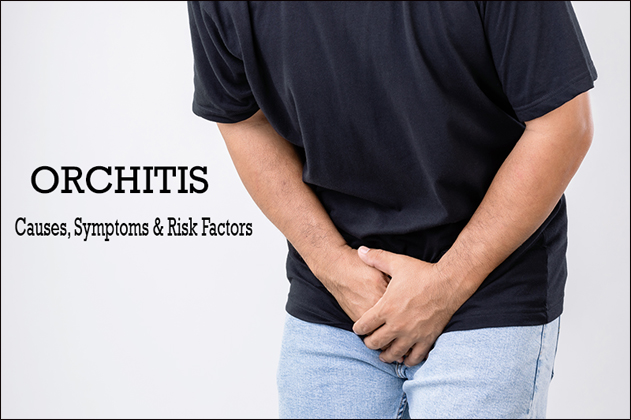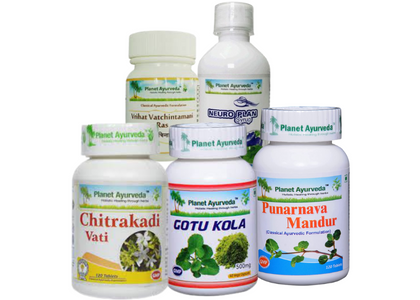What Is Orchitis?- Symptoms Causes, Diagnosis & Its Ayurvedic Management
ABSTRACT
Testicles are an important part of Male reproductive system. These are important as they produce sperms that are an essential part of fertilization. If testes are associated with any of the health concern then it may leads to sexual dysfunction and infertility too. So to avoid any of the serious issues it is must for a man to prevent the health of testicles. There are a lot of testicular diseases which affect the testicles’ health, among which one we are going to discuss in this article. The disease we are going to read about is orchitis and along with this we also know here the Management of Orchitis with Ayurvedic Herbs.
INTRODUCTION
Orchitis generally refers to inflammation of the testicles that is usually caused by bacteria or virus. In this condition both testicles get affected at same time but the symptoms may appear on one side only. Usually this condition is associated with the mumps virus. In common language it may be considered as swelling of the testes. Most people may recover within a few days and some of them may suffer with complications too. These are some of the brief views about orchitis, further we will discuss its causes, symptoms and other aspects in detail.

CAUSES OF ORCHITIS
This condition does not generally occur alone; there must be any condition with which it is secondarily associated. Most commonly it occurs secondary to bacterial or viral infection. As we mentioned, bacteria and viruses are responsible for Orchitis among them the most common is Mumps. When this is the cause, the inflammation of the testes occurs after 4-6 days of infection.
Other common causes of Orchitis are as follows
- UTIs (Urinary tract infections) and Infection of prostate (bacterias involved – staphylococcus, streptococcus, escherichia coli, pseudomonas aeruginosa, klebsiella pneumoniae)
- Rubella is another leading cause in younger people.
- Other viruses included: Varicella, coxsackievirus, cytomegalovirus or echovirus.
- Bacterial STDs include: Gonorrhea, Chlamydia, syphilis.
- Inflammation occurs in immunocompromised persons due to – Cryptococcus neoformans, Toxoplasma gondii, Candida albicans, Haemophilus parainfluenzae and mycobacterium avium complex.
RISK FACTORS OF ORCHITIS
Following are some of the risk factors of Orchitis
- Multiple sexual partners
- History of epididymitis
- Sexual contact without protection
- Obstruction in Bladder outlet
- Excessive use of foley catheter
- Not vaccinated by MMR vaccination
SYMPTOMS OF ORCHITIS
The symptoms may vary from mild to severe and may affect both the testes but typically the symptoms may occur in one side.
The common symptoms experienced by the affected person are mentioned as follows
- Blood in semen
- Pain in testicles
- Groin pain
- Fever
- Discharge from penis
- Heavy feeling, tenderness and swelling in testicle
- Pain during intercourse
- Pain while ejaculation
- Painful urination
DIAGNOSIS OF ORCHITIS
For diagnosing Orchitis first of all a doctor may ask your medical as well as family history. After that physical examination is to be done to make the diagnosis more clear. If after this the diagnosis is not so clear the doctor may refer you for a urine examination or urethra swab that will help to evaluate any kind of STD. If there is pain and bleeding a doctor must check for any kind of torsion or twisting of the testes. If there is any doubt about this then a patient must be referred for colour doppler ultrasonography.
AYURVEDIC VIEW OF ORCHITIS
According to Ayurveda, Orchitis can be correlated to Kuranda Roga and is usually known as Vridhi Roga. Basically phala kosh vridhi (testicular enlargement) is the main characteristic feature of Orchitis as per Ayurveda. Due to jeevanu (bacterias, viruses, etc) there is aggravation of tridosha, kapha aggravation leads to swelling, vata aggravation cause vridhi (increase in swelling) and shoola (pain) and pitta dosha vitiation cause bleeding from the penis after vitiating rakta dosha. So there is a need to boost up the immune system to eliminate jeevanu (infection) that is the main cause of vridhi. For this purpose Planet Ayurveda provides various herbal remedies that we will discuss in the upcoming study below.
HERBAL REMEDIES BY PLANET AYURVEDA FOR ORCHITIS
Planet Ayurveda is an ISO certified Ayurvedic company which has been serving mankind for many years. It is up and running on the basis of Ayurvedic Aim of maintaining the health of the healthy person and eliminating the disease of the diseased person. They formulates the products on the basis of this mentioned aim. All the products are 100% natural and can be given to any patient of any age. The remedies are devoid of preservatives and synthetic materials like gums, color, fibers, resins, etc.
For eliminating the above mentioned condition of Orchitis Planet Ayurveda provides the following formulations
- GOKSHURADI GUGGUL
- SEPTRIN TABLETS
- MAHAMANJISTHAGHAN VATI
- PUNARNAVA CAPSULES
- BOSWELLIA CURCUMIN

PRODUCT DESCRIPTION
1. GOKSHURADI GUGGUL
Gokshuradi Guggul is a classical Ayurvedic formulation which is prepared by Planet Ayurveda under the strict observance of M.D. Ayurveda practitioners. This remedy is available in tablet form which includes the ingredients such as gokshura (Tribulus teresteris), Guggul (Commiphora mukul), Ginger (Zingiber officinale) and various others. This formulation consists of miraculous diuretic properties that help in alleviating symptoms of Orchitis such as painful urination, discharge from penis, etc. Also besides this the remedy is considered as best for promoting overall male reproductive health.
Dosage: 2 tablets twice daily with plain water after meals.
2. SEPTRIN TABLETS
Septrin Tablets is a herbal remedy formulated by Planet Ayurveda especially for alleviating infections. These herbal tablets consist of ingredients such as guggul (Commiphora mukul), tulsi (Ocimum sanctum), sonth (Zingiber officinale) and various others. These tablets consist of herbs that have the best anti-infective, anti inflammatory and immunomodulatory effects. Due to these properties Septrin tablets by eliminating infections and by reducing inflammatory responses help in alleviating the condition of Orchitis.
Dosage: 2 tablets twice daily with plain water after meals.
3. MAHAMANJISTHAGHAN VATI
This remedy is one of the classical Ayurvedic formulations which has been used since ancient times mainly for blood purification. The remedy is available in tablet form and consists of ghan (extract) of mahamanjisthadi kwath. These tablets have blood purifying and detoxifying properties. So by cleansing the blood it alleviates infections thus relieves Orchitis and its various symptoms. Moreover these tablets prevent blood in semen while ejaculating and relieves painful ejaculation too.
Dosage: 2 tablets twice daily with plain water after meals.
4. PUNARNAVA CAPSULES
It is a single herbal capsule formulation which is prepared by Planet Ayurveda with the standardized extract of the herb Punarnava (Boerhavia diffusa). Punarnava has been known for its best diuretic properties since ancient times in the field of Ayurveda. The diuretic action of this herb makes these capsules effective in eliminating accumulated inflammatory agents in testes and in alleviating the various symptoms. These capsules are beneficial in relieving heavy feeling, tenderness and swelling in testicles.
Dosage: 1 capsule twice daily with plain water after meals.
5. BOSWELLIA CURCUMIN
Boswellia Curcumin capsules are pure herbal capsules prepared by Planet Ayurveda. These capsules consist of standardized extracts of two herbs: shallaki (Boswellia serrata) and curcumin (Curcuma longa). Both these herbs are well known for its anti-inflammatory, analgesic and antioxidant effects. So these properties of herbs make these capsules effective in relieving pain and inflammation in the testicles. Also these capsules inhibit the further inflammatory responses of various infectious agents such as bacterias and viruses.
Dosage: 1 capsule twice daily with plain water after meals.
Contact Planet Ayurveda to provide you the costing / ordering and delivery information at – costing.planetayurveda@gmail.com or call at +91-172-5214040 Or Check Website – www.PlanetAyurveda.com
CONCLUSION
Orchitis generally refers to inflammation of the testicles that is usually caused by bacteria or virus. If testes are associated with any of the health concern then it may leads to sexual dysfunction and infertility too. It is very important to maintain the health of testis to avoid conditions such as infertility and other reproduction related health issues. The main cause of Orchitis is considered as infections due to bacterias and viruses and Orchitis is considered as secondary to these infections. The main symptoms included are Blood in semen, Pain in testicles, Groyne pain, Fever, Discharge from penis and some other associated symptoms. As per Ayurveda this condition is associated with Kuranda roga or commonly it is considered as phal kosh vridhi which means inflammation of testis. In Ayurveda this condition is managed by herbs and for this purpose Planet Ayurveda provides various herbal remedies that you can consume if you have Orchitis. These remedies are free from any kind of added preservatives and any type of synthetic materials so you can consume it without worrying about side effects.




